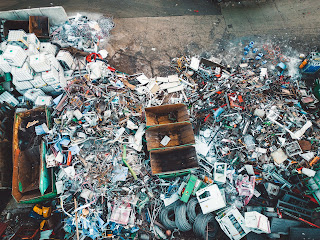Introduction:
Electronic garbage, or "e-waste," has grown to be
a major worldwide problem with significant effects on both the environment and
public health. Like many industrialised countries, the UK is struggling to deal
with the growing issue of disposing of electronic trash. The startling rise of
e-waste can be attributed to both the quick speed at which technology is
developing and the short lifespan of electronic gadgets. This essay explores
the problems that electronic trash poses for the UK's environment as well as
possible human rights abuses brought on by inappropriate e-waste
disposal.
The Scope of Electronic Waste in the UK:
The United Kingdom is a significant user of electronic
products, including everything from laptops and smartphones to industrial gear
and home appliances. The amount of e-waste produced in the nation has increased
dramatically due to the expansion of consumer electronics and the ongoing cycle
of upgrades. To address this problem, the Waste Electrical and Electronic
Equipment (WEEE) Directive was put into effect in 2003 and then updated in 2012
to provide rules for the appropriate handling, disposal, and recycling of
electronic waste.
The amount of e-waste in the UK, however, continues to be a
major hazard to the environment and public health despite regulation efforts.
The UK produced 23.9 kg of e-waste per person in 2019, underscoring the need of
putting efficient waste management plans into place as soon as possible.
Environmental Impact of Improper E-Waste Disposal:
There are serious environmental consequences when electronic
garbage is improperly disposed of. Hazardous elements including lead, mercury,
and cadmium found in many electrical gadgets can leak into soil and water
sources if they are not properly handled and disposed of. When e-waste is
burned, harmful particles are released into the atmosphere, which worsens
respiratory conditions and air pollution.
Another popular way to dispose of e-waste is in landfills,
which causes hazardous materials to build up in the ground. Long-term
environmental effects include ecological damage, groundwater pollution, and
soil degradation. Furthermore, the creation of electronic equipment requires a
lot of energy, which increases the carbon footprint of e-waste and contributes
to climate change.
Human Rights Concerns in E-Waste Management:
In addition to endangering the environment, inappropriate
treatment of electronic waste raises human rights issues, especially due to
worldwide e-waste traffic. The majority of the world's e-waste is transferred
to underdeveloped nations, where recycling methods are often informal and
uncontrolled. Vulnerable groups are frequently exploited in this practice,
including child labour and hazardous working conditions.
Without the right safety precautions, workers at unofficial
e-waste recycling plants are exposed to toxic contaminants. Individuals' basic
human rights are violated by the absence of control and regulation in these
businesses, putting their health and well-being in jeopardy. Furthermore, as
wealthier nations export their waste issues to less developed economies, the
worldwide trade in e-waste raises concerns about environmental justice and
equality.
Steps Towards Sustainable E-Waste Management:
To tackle the issues presented by electronic waste, a
thorough and multifaceted strategy is needed. The UK needs to improve the laws
governing the management of e-waste and make sure that electronic gadgets are
recycled and disposed of responsibly. This involves pushing producers to design
goods with lifetime and recyclability in mind and supporting environmentally
friendly materials in electronic devices.
Educating and raising public awareness are essential parts
of solving the e-waste
problem. It is important for the public to know how to properly dispose of
electronic devices and the consequences that incorrect disposal can have on the
environment and human rights. Furthermore, programmes encouraging the
maintenance and restoration of electronic equipment can help them last longer,
which lowers the total amount of e-waste produced.
A sustainable e-waste management system requires cooperation
between manufacturers, governments, and the recycling sector. This entails
fostering e-waste recycling technology research and innovation as well as
forging international agreements to control the world's trade in electronic
trash.
Conclusion:
In the UK, electronic waste threatens both human rights and
the environment. The growing amount of electronic trash needs immediate
attention as well as coordinated efforts to create and execute sustainable
waste management techniques. The UK can contribute to a cleaner and more
equitable future for all by tackling the environmental effect of electronic
waste and minimising human rights abuses linked with its inappropriate
disposal.


Comments
Post a Comment